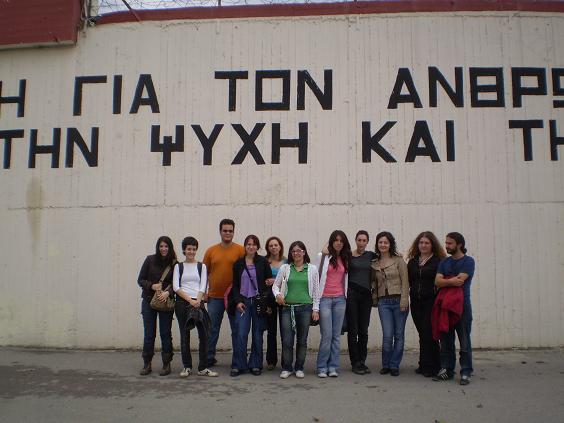Konstantinos Panagos,
Student, Law School of Thessaloniki
The “EPAFI” (“CONTACT”) program is an initiative by the Law students in the Aristotle University of Thessaloniki to communicate with young prisoners in the prison of Diavata in Thessaloniki beginning in March 2008. This program is sponsored by the Greek General Secretariat for Youth (Youth Institute) and is coordinated by Sofia Giovanoglou, Dr. of Law, who is also the legal representative of the group of student volunteers. The program itself is a continuation of an earlier one conducted by the Department of Criminal Law and Criminology at the Aristotle University of Thessaloniki since 2001, entitled “DIODOS” (“PATHWAY”).

The aim of the “EPAFI” program is to build a bridge of communication between two similar age groups (19 to 20 years old on average), students of law on one side, and young prisoners in the prison of Diavata in Thessaloniki on the other. Specifically, the program seeks to reduce the prisoners’ sense of isolation and exclusion, to extend their knowledge of their rights and obligations, to reduce the "stigma" that leads them back to prison, and to assist their reintegration into society. Moreover, it seeks to engage students with the volunteering process. The overall length is 18 months (March 2008 - May 2009).

The volunteers in order to prepare for entering the prison attend six seminars on the following issues: 1) "Voluntary assignment of students in the framework of programs for the social reintegration of prisoners. Volunteers and students from the 1st and 2nd phases of the earlier “DIODOS” program describe their experience as volunteers. 2) "Criminal treatment of children; sentencing practices of youngsters and their life in prison.” 3) "Rights of Prisoners: e.g. the right to communicate" 4) “Institutional problems of social reintegration of released prisoners”. 5) "The role of volunteers in correctional detention facilities and 6) "Approaches to drug addiction: the drama-therapy method ".

In May 2008 the planned visits by the student volunteers to the prison of Diavata in Thessaloniki began with the implementation of Drama Therapy activities, discussions and exchanges of views on the rights and obligations of prisoners, other informal education courses, etc.
Also, on Saturday, 24th May 2008, student volunteers who had been moved by the isolation of the young prisoners, performed a play in the prison in cooperation with the Student Week and the "Greek Playback Theater" group. The Playback performance, which differed from the traditional form of theater, because it involved participation from both the actors and the audience (young prisoners and students), successfully achieving its interactive-entertainment aim. It encouraged young prisoners to describe their personal experiences to be interpreted and dramatized by the trained actors, sharing in this way their feelings with the students.

The website of the Program is under construction (http://contact.web.auth.gr),that will provide an electronic forum for discussions between the team of student volunteers with students from other universities, as with other stakeholders. Finally, the program is due to complete in May 2009 with a forum held at the Aristotle University of Thessaloniki for the presentation and dissemination to the general public of the results.





